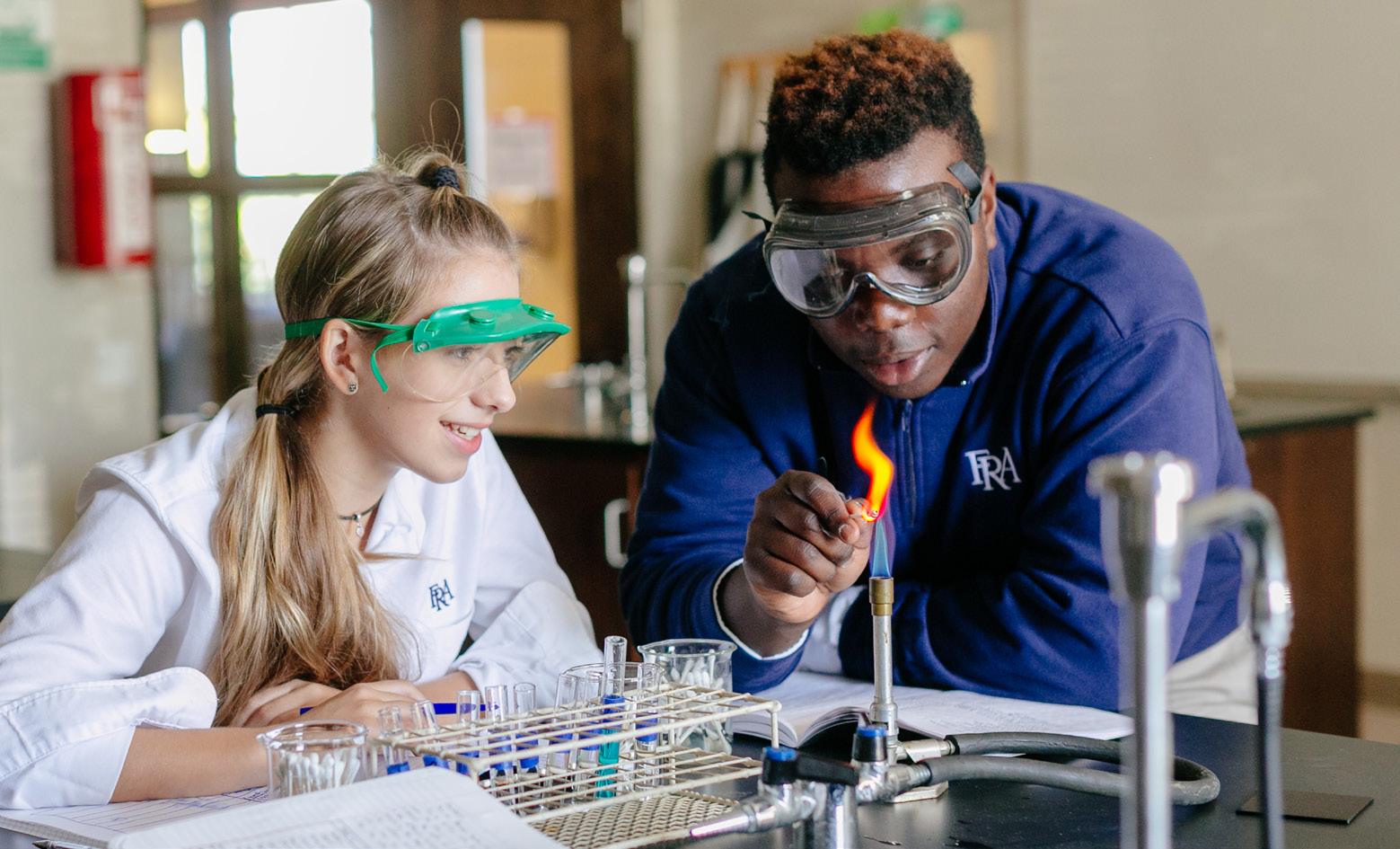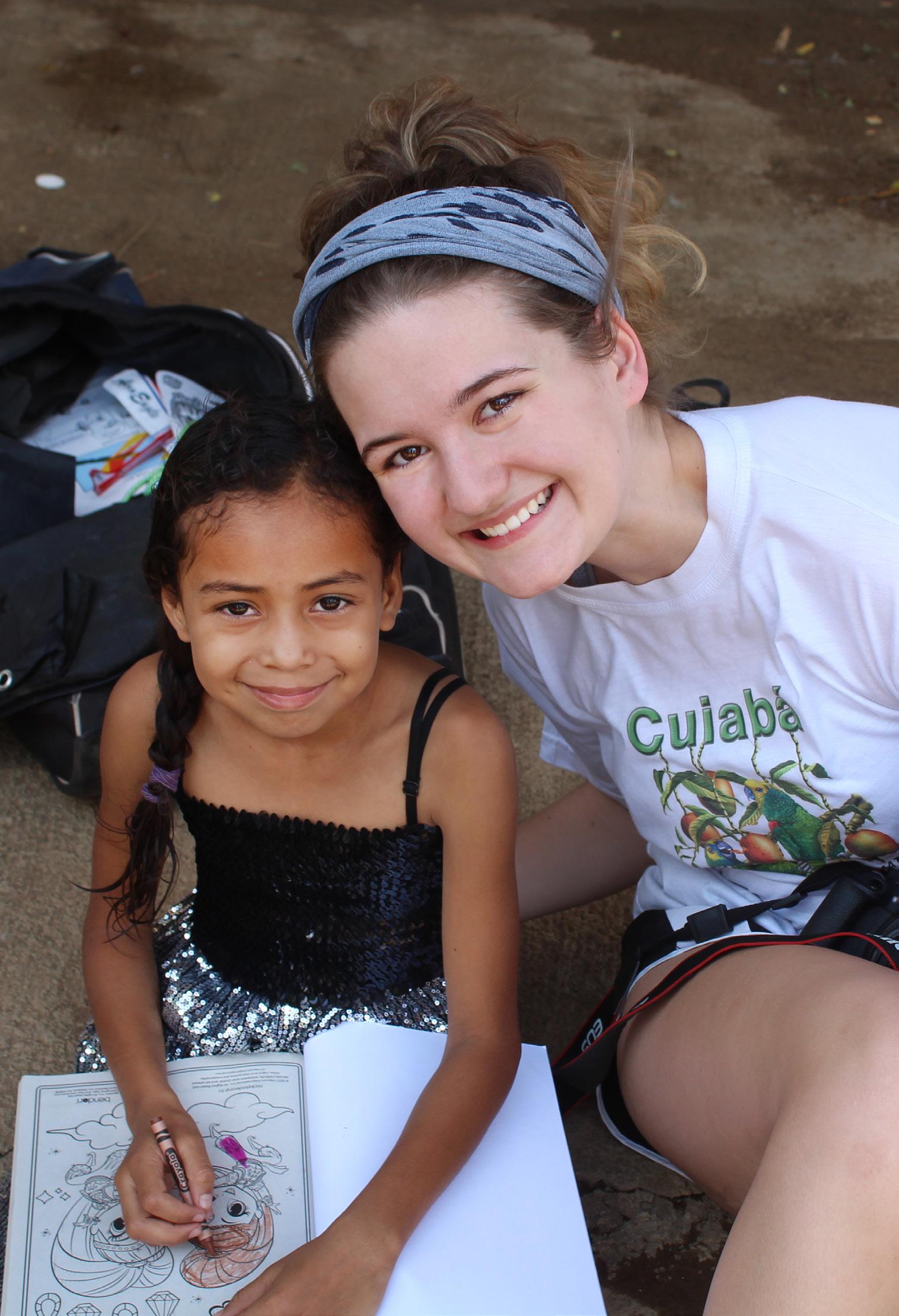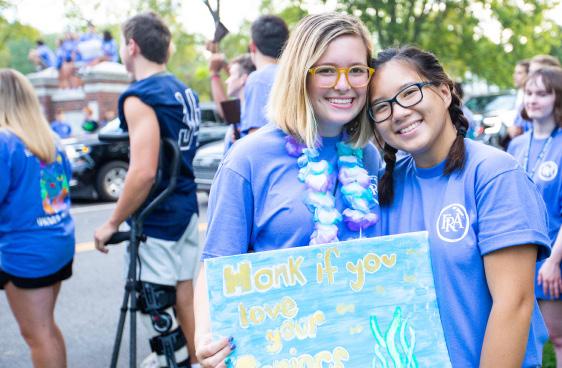
8 minute read
Science Department
The goal of the FRA science department is to prepare students with the skills and knowledge needed to develop a functional understanding of biological and physical principles in a college-preparatory setting. Students are exposed to successively more sophisticated concepts and experimental skills that allow them to investigate the nature and behavior of matter, energy, and living organisms. The science faculty is committed to offering active learning experiences, engaging the students through lecture, discussion, projects, and laboratory work. These various modes of instruction help students develop and enhance their ability to think critically and communicate intelligently about scientific problems and issues. Throughout the program, students pose and investigate questions about observable natural phenomena, analyze quantitative and qualitative information, and examine the historical development of fundamental principles through the use of 21st-century skills.
Extensive laboratory skills are taught and utilized in upper level classes. AP courses in chemistry, biology, and physics follow the topic outlines set forth by the College Board for their respective disciplines. Required laboratory series in these classes prepare students for college laboratory success.
SCIENCE (3 CREDITS REQUIRED)
All students must successfully complete Biology, Chemistry, and Physics.
COURSE OPTIONS:
Biology I or Biology I (H) Chemistry I or Chemistry I (H) Physics I or Physics I (H) AP Biology AP Chemistry AP Physics I Anatomy & Physiology* (11-12) Robotics* (10–12) Engineering* (10–12) Environmental Science* (10–12) Science of Innovation* (10–12) Biotechnology* (10-12)
*One-semester course
BIOLOGY I
1 Credit
This course is designed to give a basic understanding of living organisms and how they function. Biological communities, basic organic chemistry, cellular cytology studies, genetics, change over time, taxonomy, ecology are all studied. The units are planned with college preparation in mind as well as an effort to stimulate a genuine interest in the sciences. Extensive lab work, dissections, and written lab reports are required.
BIOLOGY I (H)
1 Credit
Honors Biology is a rigorous year-long laboratory course designed for freshman students. Honors Biology covers topics covered in a high school biology course and prepares students for AP Biology. Students study the structures, functions, and process of living organisms and their interactions with the environment. Major themes include cell structure and specialization, energy and chemistry of life, genetics and evolution, diversity of life. Students learn complex biological concepts through interactive lectures and application, and knowledge is assessed through quizzes, labs, tests, and projects. The curriculum integrates writing skills, critical-thinking skills, laboratory skills, and dissections. In addition, the course work will emphasize microscopy, calculating data, graphing, and free response questions.
CHEMISTRY I
1 Credit
This course utilizes problem-solving skills as well as laboratory explorations and mathematical reasoning to examine the basics of atomic theory, chemical reactions, thermochemistry, gas laws, and colligative properties. Prerequisites for this course include Algebra I and Biology I, and concurrent enrollment in or completion of Algebra II is also required.
CHEMISTRY I (H)
1 Credit
This course focuses on mastery of concepts, mathematical skills, laboratory reasoning, and problem-solving skills. Rigorous algebra is used frequently to analyze chemical concepts. Topics to be covered in this course include nomenclature, stoichiometry, thermochemistry, gas laws, atomic theory, and solution chemistry. Prerequisites for this course include successful completion of Algebra I and Biology I, and concurrent enrollment or completion of Algebra II is highly recommended. Chemistry I (H) prepares students to take AP Chemistry the following year.
AP BIOLOGY
1 Credit
AP Biology is an introductory college-level biology course for students who have successfully completed high school courses in biology and chemistry. AP Biology is equivalent to a two-semester college introductory biology course. Students cultivate their understanding of biology through inquirybased investigations as they explore: evolution, cellular processes, energy and communication, genetics, information transfer, ecology, and interactions. This course spends over 25% of instructional time doing hands-on laboratory work, with an emphasis on inquiry-based investigations that provide students with opportunities to apply the science practices. The course is based on four big ideas, which encompass core
scientific principles, theories, and processes that cut across traditional boundaries and provide a broad way of thinking about living organisms and biological systems. The following are big ideas: 1. Evolution - The process of evolution explains the diversity and unity of life. 2. Energetics - Biological systems utilize free energy and molecular building blocks to grow, reproduce, and maintain dynamic homeostasis. 3. Information Storage and Transmission - Living systems store, retrieve, transmit, and respond to information essential to life processes. 4. Systems Interactions - Biological systems interact, and these systems and their interactions possess complex properties.
Prerequisites for this course are Honors Biology I and Honors Chemistry I.
AP CHEMISTRY
1 Credit
As a continuation of the Chemistry I Honors class, this course examines the equilibrium condition, including basic equilibrium, acid-base chemistry, solubility equilibrium, coordination chemistry, thermodynamics, and chemical kinetics. Other topics that are studied include electrochemistry, nuclear chemistry, organic chemistry, and descriptive chemistry. Students will be required to use mathematical reasoning skills, laboratory reasoning, and problem-solving techniques to work problems involving very rigorous algebra computations centered on chemical concepts. Prerequisites for this course are successful completion of Chemistry I Honors and concurrent enrollment in PreCalculus. Upon completion of this course, students are prepared to take the AP Chemistry exam.
PHYSICS I 1 Credit
Physics I is a college preparatory course designed to provide an algebra-based introduction to physics, with a focus on classical Newtonian mechanics, work and energy, momentum, waves, and electricity. The course also provides significant laboratory experience aimed to highlight the connection between physics principles and everyday life. Completion of Algebra II is a prerequisite for this course.
PHYSICS I (H)
1 Credit
Physics Honors I is a rigorous, algebra-based, collegepreparatory physics class designed for strong students who have a desire to continue in science or engineering in college or continue on to AP Physics while at FRA. The course focuses on Newtonian mechanics, work and energy, momentum, rotational motion, and waves. The course also provides a significant laboratory component aimed to develop critical thinking analytical skills while deepening students’ understanding of physics concepts. A strong performance in Algebra II is a prerequisite for this course.
AP PHYSICS I
1 Credit
This course conforms to the College Board topics for the AP Physics 1 Examination. AP Physics 1 is equivalent to a firstsemester college course and laboratory in algebra-based physics. The course is designed to use six big ideas in physics – systems, fields, force interactions, change, conservation, and waves - as a vehicle to develop eight core science practices. The content of this course trains students to think like physicists while also improving science literacy and critical thinking skills. This course focuses on both linear and rotational Newtonian mechanics (motion and forces) but also includes topics such as work and energy, DC circuits, and waves. The course requires a substantial lab component.
ANATOMY & PHYSIOLOGY
½ Credit
This course offers an in-depth study of human anatomy and physiology. The areas covered include medical terminology, basic chemistry, cell and tissue structure, and the systems of the human body.
Numerous applications and everyday examples will show how the human responds to disease, injuries, as well as what conditions help to optimize health. Dissections of various body parts (using mammalian animal specimens) will be used to show how anatomy relates to physiology.
ROBOTICS
½ Credit
This STEM course consists of two parts. In part one, students will utilize the VEX robotics platform and learn the basic principles of robotics and coding. In part two, students will be introduced to more advanced computer coding and will utilize the open-source Arduino robotics platform. Upon completion, students will have a deeper understanding of the principles of robotics as well as how to design, build, and control various robots.
ENGINEERING
½ Credit
Engineers seek to better the world by developing creative solutions to design problems through the improvement or creation of products or systems that serve society. This semester long course will introduce students to the field of engineering through the Engineering Design Process. The course will focus on the development of problem solving and critical thinking skills through case studies and handson, project- based coursework. Through the exploration of each step of the design process, students will also learn about important challenges faced by and crucial skills required of engineers including, but not limited to, cultural sensitivity, ethics, and engineering drawing. The second half of the course will allow students to work through the full design process from problem statement to final product, culminating in an oral presentation and demonstration of each group’s product.
THE SCIENCE OF INNOVATION
½ Credit
This is a one semester course designed to give the student a hands-on approach to science and engineering. This course will feature many hands-on challenges for the student as well as interactive discussions centered on class content.
The goal of this course is to cover the following four broad areas: 1. Module I: Molecular Biology & Medicine 2. Module II: Green technologies of today and tomorrow 3. Module III: Student-driven applied science and engineering projects 4. Module IV: Careers in Science and Technology
ENVIRONMENTAL SCIENCE (Not offered in 2021-22) ½ Credit
This laboratory science examines the composition of ecosystems and the impacts of human activity. Topics covered include matter and energy, sustainable agriculture, freshwater quality and cycling, waste disposal, alternative energy sources, conservation, and environmental legislation. Labs are performed throughout the course including off-campus field trips to Radnor Lake and Ellington Agricultural Center. The program is designed to foster student environmental awareness and recognition of the importance of sustainability.
BIOTECHNOLOGY
½ Credit
Biotechnology is a semester science elective course designed to give students a comprehensive introduction to the scientific concepts and laboratory research techniques currently used in the field of biotechnology. Students will explore and evaluate career opportunities in the field of biotechnology through laboratory experiments, class discussions, research projects, guest speakers, and workplace visits. The knowledge and skills gained in this course will provide students with a broad understanding of biotechnology and the impact it has on society. This course is available for students who have successfully completed high school courses in biology and chemistry.







